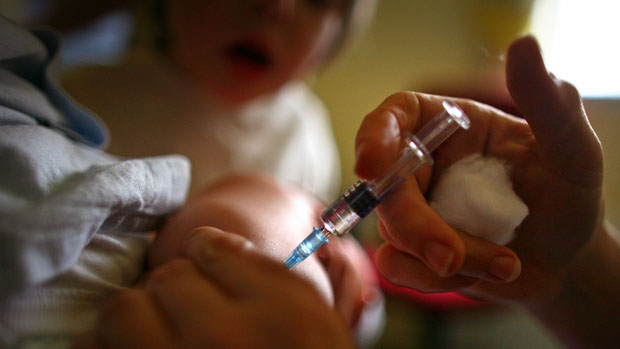Anti-vaccination groups ‘targeting new parents online’
More than half of parents of under-fives report seeing negative propaganda online

A free daily email with the biggest news stories of the day – and the best features from TheWeek.com
You are now subscribed
Your newsletter sign-up was successful
Anti-vaccination groups are using social media to spread discredited science to parents, according to a new report.
Four in ten parents with small children surveyed by the Royal Society for Public Health (RSPH) for their Moving the Needle report said they had seen negative messages online about vaccines.
“This rose to 50% for parents with children under five, when most vaccinations are offered,” says The Times.
The Week
Escape your echo chamber. Get the facts behind the news, plus analysis from multiple perspectives.

Sign up for The Week's Free Newsletters
From our morning news briefing to a weekly Good News Newsletter, get the best of The Week delivered directly to your inbox.
From our morning news briefing to a weekly Good News Newsletter, get the best of The Week delivered directly to your inbox.
In November, a US-based “anti-vax” group was censured by the Advertising Standards Authority over a promoted Facebook post which claimed that “any vaccine given at any age [can] kill your child”.
The paid-for post, which also claimed that “if this unthinkable tragedy does occur, doctors will dismiss it as ‘sudden infant death syndrome’”, was targeted to new parents using Facebook’s ad technology.
“The ASA ruled that the post was misleading advertising and likely to cause fear and distress,” says The Guardian.
The vast majority of British parents - nine out of ten surveyed by the RSPH - agreed that vaccines were important for their children’s health.
A free daily email with the biggest news stories of the day – and the best features from TheWeek.com
However, among those who chose not to vaccinate their children, “fear of side effects… was consistently found to be the primary reason”, says the report.
The anti-vaccination movement arose in response to a now-discredited 1998 paper by British doctor Andrew Wakefield in which he claimed that vaccines put children at a higher risk of developing autism.
Although any link between vaccination and medical disorders has been thoroughly rejected by the mainstream scientific establishment, the number of parents choosing not to vaccinate their children has grown in recent years.
Measles rates in Europe are at a 20-year high, and the preventable disease claimed dozens of lives last year.
Last week, the World Health Organisation (WHO) listed “vaccine hesitancy” alongside ebola and antibiotic resistance as among the ten most dangerous public health threats facing the world in 2019.
The WHO said its own research highlighted “complacency, inconvenience in accessing vaccines, and lack of confidence” in their safety as key factors for parents who failed to have their children vaccinated.
The organisation added that vaccines currently prevent between two and three million deaths per year globally.
-
 How the FCC’s ‘equal time’ rule works
How the FCC’s ‘equal time’ rule worksIn the Spotlight The law is at the heart of the Colbert-CBS conflict
-
 What is the endgame in the DHS shutdown?
What is the endgame in the DHS shutdown?Today’s Big Question Democrats want to rein in ICE’s immigration crackdown
-
 ‘Poor time management isn’t just an inconvenience’
‘Poor time management isn’t just an inconvenience’Instant Opinion Opinion, comment and editorials of the day
-
 Trump HHS slashes advised child vaccinations
Trump HHS slashes advised child vaccinationsSpeed Read In a widely condemned move, the CDC will now recommend that children get vaccinated against 11 communicable diseases, not 17
-
 A fentanyl vaccine may be on the horizon
A fentanyl vaccine may be on the horizonUnder the radar Taking a serious jab at the opioid epidemic
-
 Health: Will Kennedy dismantle U.S. immunization policy?
Health: Will Kennedy dismantle U.S. immunization policy?Feature ‘America’s vaccine playbook is being rewritten by people who don’t believe in them’
-
 How dangerous is the ‘K’ strain super-flu?
How dangerous is the ‘K’ strain super-flu?The Explainer Surge in cases of new variant H3N2 flu in UK and around the world
-
 Vaccine critic quietly named CDC’s No. 2 official
Vaccine critic quietly named CDC’s No. 2 officialSpeed Read Dr. Ralph Abraham joins another prominent vaccine critic, HHS Secretary Robert F. Kennedy Jr.
-
 This flu season could be worse than usual
This flu season could be worse than usualIn the spotlight A new subvariant is infecting several countries
-
 Why are autism rates increasing?
Why are autism rates increasing?The Explainer Medical experts condemn Trump administration’s claim that paracetamol during pregnancy is linked to rising rates of neurodevelopmental disorder in US and UK
-
 RFK Jr. vaccine panel advises restricting MMRV shot
RFK Jr. vaccine panel advises restricting MMRV shotSpeed Read The committee voted to restrict access to a childhood vaccine against chickenpox